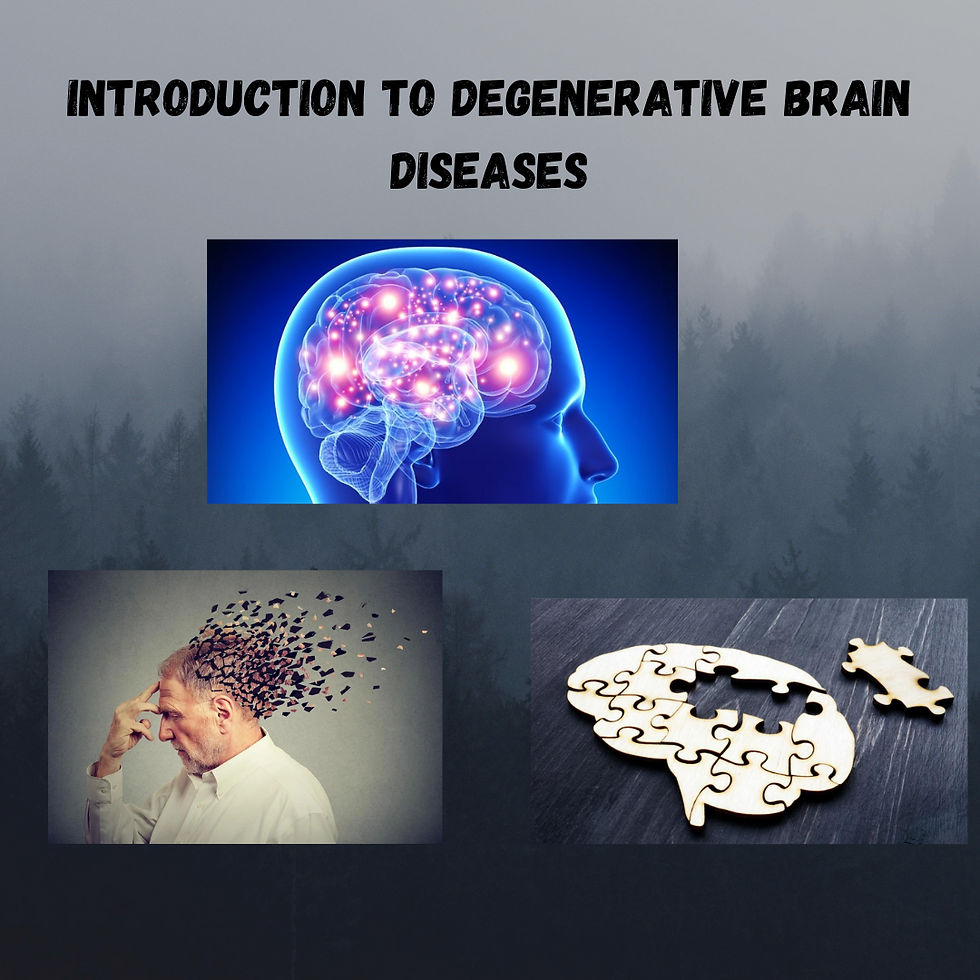Introduction to Degenerative Brain Diseases Part 1- Alzheimer's
- Romit Chunduri
- Apr 7, 2022
- 3 min read
Updated: Apr 8, 2022

Hello everyone, and welcome to my sixth blog post. Today we will be talking in-depth about a specific type of degenerative brain disease!
Degenerative Brain Diseases
The decrease and death of nerve cells called neurons cause degenerative brain disorders. These disorders are progressive, which means that as more neurons in the brain die, the condition worsens with time. The patient loses intellectual function in crucial areas such as speech, memory, and spatial abilities as the brain deteriorates. The most common type of degenerative brain disease is Alzheimer’s Disease.
Alzheimer's Disease:
Alzheimer's disease was considered an uncommon ailment when it was first recognized by German doctor Alois Alzheimer in 1906. Alzheimer's disease, a degenerative brain illness, is now widely acknowledged as the leading cause of dementia. Alzheimer's disease affects an estimated 5.7 million Americans.
Alzheimer's disease develops in phases, starting with minor forgetfulness and cognitive decline and advancing to a complete loss of mental faculties. People with severe Alzheimer's disease become completely reliant on others for their care. The condition might last anywhere from five to twenty years, depending on the person. Infections such as pneumonia are the leading cause of mortality in Alzheimer's patients.
Alzheimer's disease has a number of risk factors, including:
Alzheimer's disease in a first-degree relative (father, sister, or brother). A few genetic variants that raise risk in some families have been discovered by researchers.
Having Down Syndrome
Hypertension is a condition in which the blood pressure (high blood pressure)
Diabetes that is poorly managed
Cholesterol levels are high.
Causes:
Alzheimer's disease has uncertain origins, however, plaques and tangles in brain tissue are assumed to be signs of the illness. Plaques form when beta-amyloid, a generally harmless protein, hardens. As a consequence, another protein produces corkscrew-like tangles. Caustic plaques burn holes in the brain, destroying more and more nerve cells known as neurons, and plaques and tangles prohibit cells from interacting with one another. As neurons die, fewer neurotransmitters are produced, producing signaling problems in the brain. The neurotransmitter acetylcholine has been found to be deficient in Alzheimer's disease sufferers' brains.
Treatment:
Aducanumab- It is presently the only disease-modifying medicine licensed to treat Alzheimer's disease. This drug is an immunotherapy that targets the protein beta-amyloid and helps to eliminate amyloid plaques, which are brain lesions linked to Alzheimer's disease.
Memantine- It is used to treat Alzheimer's disease in those who have moderate to severe symptoms. Memantine is thought to act by modulating glutamate, a key neurotransmitter. When glutamate is generated in excess, it can cause brain cell death. cholinesterase inhibitors function in various other ways, so they can be administered together with NDMA.
Donepezil- A cholinesterase inhibitor is used to treat mild, moderate, and severe Alzheimer's symptoms. It aids in preventing acetylcholine breakdown in the brain.
Galantamine- A cholinesterase inhibitor is used to treat mild to moderate Alzheimer's symptoms. It prevents acetylcholine breakdown and activates nicotinic receptors in the brain to release more acetylcholine.
Works Cited:
“How Is Alzheimer’s Disease Treated?” National Institute on Aging, www.nia.nih.gov/health/how-alzheimers-disease-treated#:%7E:text=Aducanumab%20is%20the%20only%20disease,brain%20lesions%20associated%20with%20Alzheimer’s. Accessed 8 Apr. 2022.
“Alzheimer's Disease.” Lehigh Valley Health Network, www.lvhn.org/conditions/alzheimers-disease. Accessed 8 Apr. 2022.
That is it for today's blog, thank you for having the passion and willingness to learn about degenerative diseases, as understanding these concepts can help you comprehend neuroscience easier. Next time we will be continuing our neuroscience journey with information on other types of neurological diseases. As always, please reach out if there are any questions, and let me know in what ways I can improve my blogs to bring the most fun to neuroscience.




Comments